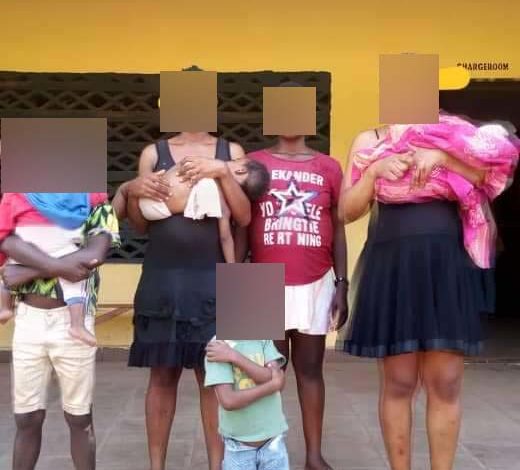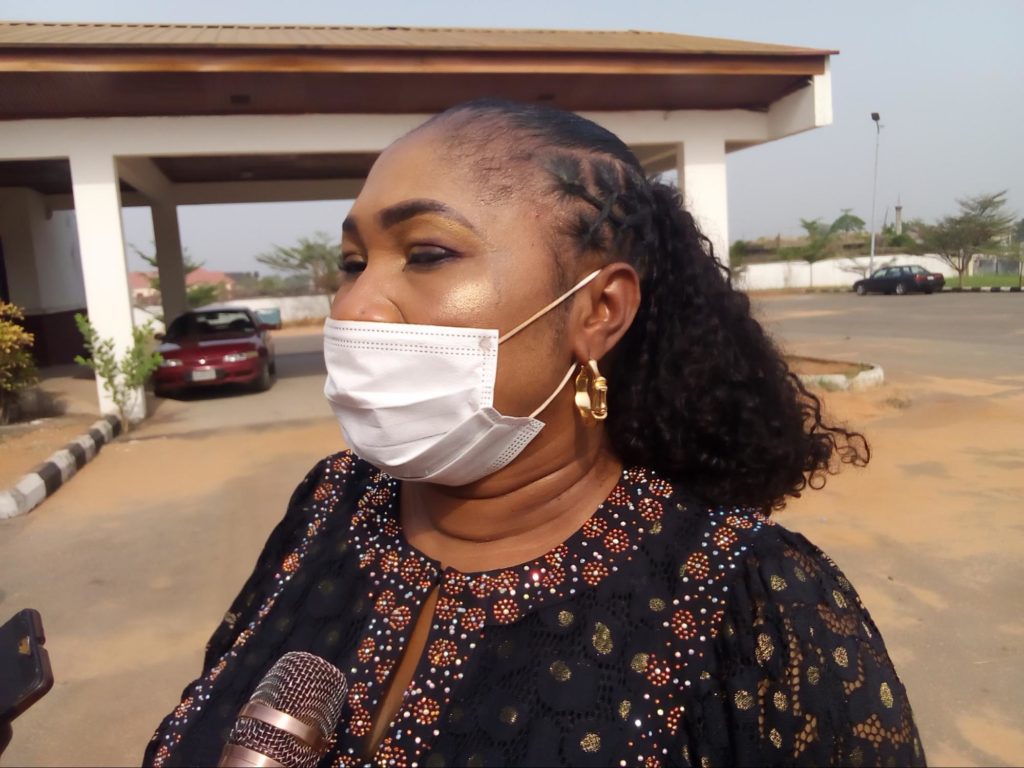Orphanages Facilitating Child Trafficking In Anambra State
Child trafficking has become prevalent in Anambra state, Southeast Nigeria, as orphanages have become a conduit for selling children.

The illicit business of child trafficking thrives in Anambra State, Southeast Nigeria, with many children displaced from their biological parents to alien homes.
Orphanages set up to give care and support for children without parents are facilitating it for financial benefits.
Some of the homes are registered with the relevant government agencies and conversant with the rules guiding their operations but venture into the human trade for money.
On Jan. 23, the police in Anambra State arrested two suspects who allegedly stole a three-year-old child from Ihiala and trafficked him to neighbouring Imo State.
The child was rescued and reunited with his parents after being rescued, the police said.
The police said traffickers often stole children from churches, schools and markets where they enticed them with gifts to lure them away from their guardians.
CSP Haruna Mohammed, the Police Public Relations Officer in Anambra State, said investigations revealed that some children stolen in the state were sold to Mrs Malvina Uba. The latter paid between N100,000 and N150,000 for each depending on their gender.
Mohammed said a raid on the home of Uba, the ‘principal recipient,’ led to the arrest of 10 members of her trafficking syndicate and rescue of two pregnant teenage girls, who were kidnapped and kept for baby-making.
“During the operation, five newly born babies and three other children were also rescued.”
“The rescued children were handed over to the Ministry of Social Welfare, Children’s and Women’s Affairs for proper care, while investigation is ongoing.”
“Principal suspect and her accomplices will be charged to court for prosecution,” he said.
Mohamed said Hauwa Usman, a woman from Gombe State, Northeast Nigeria, was arrested in October 2019 for allegedly stealing two children in Gombe and selling them to buyers in Nkpor, Idemili North Local Government Area of Anambra State.
The children were later rescued and reunited with their parents who travelled from Gombe to Anambra State to identify them after the police announced some children rescued from traffickers, he said.
Mohammed said the suspected buyer, Mrs Nkechi Odinye, 55, confessed to paying between N200,000 and N400, 000 per child depending on the age and gender.
“Investigations revealed that the children were stolen from Gombe State by one Hauwa Usman on Oct. 20, 2019, and brought to accomplices in Anambra State but following the public announcement, parents of the two kids from Gombe State came to Awka and identified their children.
“The children have since reunited with their parents and suspects were handed over to the Gombe State Police Command for discreet investigation and prosecution.
“Upon interrogation by the police in Gombe State, suspects voluntarily confessed that they usually steal the children and bring to their sponsor, one Mrs Nkechi Odinye, here in Anambra State, who buys each child at the rate of between N200,000 and 400,000 depending on their age and gender,” the officer said.
Mohammed said Odinye had evaded arrest for three years but was arrested in Obosi, Anambra State, where 16 other children, comprising 10 boys and six girls, who were also stolen, were rescued.
He said five of the children were reunited with their parents after a thorough investigation, while 11 were returned to the police command and that they had been handed over to the state government.
According to him, the command has 18 unclaimed children rescued from suspected child traffickers.
“Members of the public are kindly requested by the commissioner of police to disseminate this message to enable the biological parents or close relations to identify these children… to claim them,” he said.
Stakeholders have described the growing trend of trafficking in children as obnoxious.

Ms Hope Okoye, the Executive Director, Integrated Anti Human Trafficking and Community Development Initiative (Inter-Com Africa), a gender rights group, said orphanages and hospitals were principal grounds for child harvesting for commercial purposes.
Okoye said the orphanage practice was alien to Igbo culture as extended family members had ways of catering to the needs of children who lost their parents or who were of poor parentage.
She expressed worry that the phenomenon of human merchandising within and outside the Southeast had become popular in Igboland.
Okoye expressed regrets that orphanages meant to protect children, had become business centres for human trafficking.
She said many children were not indeed orphans but stolen from their parents for sale and ritual purposes.
Okoye said Nkpor, Obosi, Awada areas all in Idemili North Local Government Area of Anambra State were places where the crime thrived.
She said sex education and support for girls with unwanted pregnancies were important to end child trafficking. They were mostly responsible for the boom of the business in orphanages.
.
Okoye said child trafficking had become a multimillion naira industry which many people had gone into because of poverty.
According to her, people who are desperate to have children but do not want to follow due process go to the so-called motherless babies’ homes and hospitals to buy children.
“Girls are kidnapped and kept in inhuman places to make children; doctors are deeply involved in the illicit business, it is bad that our people have found a business in trading in human beings,” Okoye said.
She said the prosecution of offenders had not been easy because of the lack of facilities to keep suspects pending the investigation of cases involving them.
Okoye said there was a need for the state government to build a facility where suspects could be kept because the police often release them to go back to the society where they returned to the business.

Chris Azor, Chairman of Anambra State Civil Society Network, said the government was making an effort to curb the menace, there was a need for collaboration by the Nigeria Medical Association, the civil society, the police and the media for a more effective result.
Azor said the legal framework should be reviewed and straightened to address contemporary challenges.
He blamed the trend on social, economic and cultural factors.
“Harsh economy, displacement of people as a result of COVID-19 and the cultural orientation of having one’s children, are major factors responsible for the worrisome situation, “ he said.
Mrs Ndidi Mezue, Anambra State Commissioner for Social Welfare, Children’s and Women’s Affairs, said the government was worried by the activities of orphanages which did not conform to the principles of establishing them.
Mezue said since she assumed office in 2018, the ministry had shut down three of 35 registered orphanages in the state.
She said the ministry had also received no fewer than 22 recovered children some of whom had enrolled in schools, over the period.
The commissioner expressed worry about the slow pace of prosecuting suspects and urged the police to expedite the process of bringing offenders to book.
“The ministry has visited the 35 registered motherless babies’ homes in Anambra and out of this number, I closed down three for not operating within the rules guiding orphanages in Anambra.
“We are worried about the rate of child trafficking in the state; regrettably, they are registered with the ministry.”
“We have closed one in Enugu-Agidi, Obosi and Ukpor; there is another one in Oba which I have directed the head of department in charge to close.”
“The ministry has received a total of 22 of such children, some of them have been here for year’s; in 2019, we enrolled 15 of them in schools.
“The police are investigating some of the cases, but as a ministry, what we did was to receive some of these children, they are in our various homes.
“Police should help hasten the persecution of the traffickers involved so that we can reconcile the children with their parents or relations,” she said.
What Child’s Right Law Says About Adoption
The National Assembly passed the Child’s Right Law in 2004 which was domesticated in Anambra State in 2017.
The law criminalises all forms of trafficking in persons, including illegal custody of underage children, child labour, child sexual abuse, unlawful adoption and illegal fostering.
The law specifies a child who can be adopted, the conditions and processes for adoption and those who can adopt a child.
Section 125 of the Act says “state governments and the Federal Capital Territory are empowered to establish and operate adoption services to meet the needs of a child who has been or may be adopted, parents and guardians of the child needing adoption and persons who have adopted or who may adopt a child”.
“For this purpose, every Government shall provide the requisite facilities or ensure that the facilities are provided by approved adoption services as may be prescribed by the appropriate authority, ” the law states.
It adds that anybody who needs to adopt a child must apply for adoption to the Court accompanied by a marriage certificate or a sworn declaration of marriage where the applicant is a married couple.
Other requirements include a birth certificate or sworn declaration of each applicant’s age, two passport-size photographs of each applicant, a medical certificate of the applicant’s fitness from a government hospital; and such other documents, requirements and information as the Court may require for the adoption.
The law provides that upon receipt of an application, the Court shall order an investigation to be conducted by a child development officer, a supervision officer and such other persons as the Court may determine, to enable the Court to assess the suitability of the applicant as an adopter and of the child to be adopted.
“The Court shall, in reaching a decision relating to the adoption of a child, have regard to all the circumstances, first consideration being given to the need to safeguard and promote the welfare and the best interest of the child throughout the childhood of that child,” the statute states.
The law also states the need to “ascertain as far as practicable, the wishes and feelings of the child regarding the decision and giving due consideration to those wishes and feelings, having regard to the age and understanding of the child.”
Section 129 specifies that those who may adopt a child include a married couple where each of them has attained the age of 25, and there is an order authorising them jointly to adopt a child; or a married person, if who has obtained the consent of the spouse, as required under Section 132.
The law further states that a child adopter may be “a single person, if he has attained the age of thirty‐five years, provided that the child to be adopted is of the same sex as the person adopting or in all cases, adopters shall be persons found to be suitable to adopt the child in question by the appropriate investigating officers.”
Support Our Journalism
There are millions of ordinary people affected by conflict in Africa whose stories are missing in the mainstream media. HumAngle is determined to tell those challenging and under-reported stories, hoping that the people impacted by these conflicts will find the safety and security they deserve.
To ensure that we continue to provide public service coverage, we have a small favour to ask you. We want you to be part of our journalistic endeavour by contributing a token to us.
Your donation will further promote a robust, free, and independent media.
Donate HereStay Closer To The Stories That Matter




